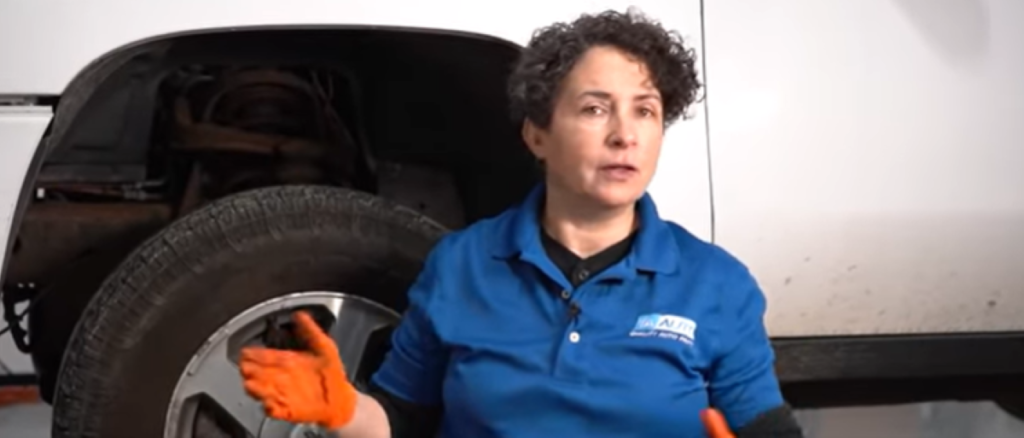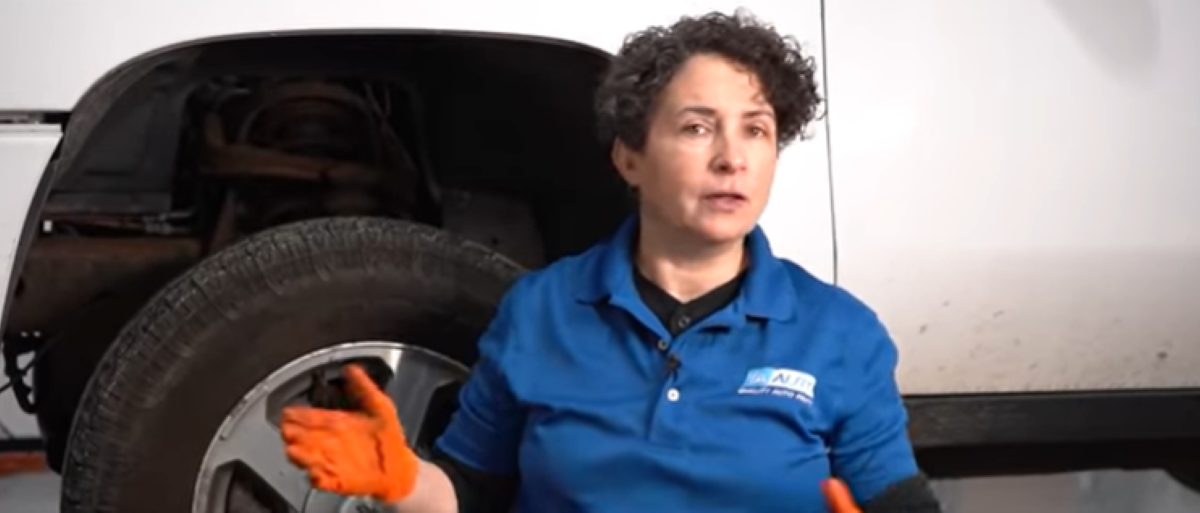If you have wheel bearing that’s grinding and howling, the noise is just the beginning. Find out what can make your wheel bearing and hub assembly so noisy and what happens if the howling goes unfixed for too long.
2 Main Symptoms of a Grinding or Howling Wheel Bearing

- Howling when driving
- Wobbling when driving
When a wheel bearing goes bad, howling starts before wobbling. Howling happens when the bearings are starting to separate. They can lose grease from age and take damage from the road, like when driving over a pot hole. It’s important to listen for a howling noise and to catch this issue before the wheel starts to wobble, which can be unsafe to drive with.
You’ll hear the howling and it can vibrate through the knuckle, subframe, and into the floorboard.
How to Diagnose a Howling or Bad Wheel Hub Assembly
How to diagnose a howling or grinding wheel bearing
- Jack Up the Vehicle
You can diagnose a bad wheel bearing without tools and just a jack or a lift. Jack up the wheel you hear the noise from, and check the opposite side after since this is an opportunity to check other parts like tie rods.
- Spin the Wheel and Listen for a Sound and Vibration in the Coil Spring or Control Arm
Raise vehicle, and turn wheel while holding control arm or strut spring. You will feel a vibration up through the knuckle, up the knuckle shaft, to the ball joint, to the control arm if the bearing is worn. You may need help from someone to turn the wheel. Listen for the growling or grinding noise when turning the wheel.

- Press the Tire in and out from 12 and 6 o’clock and feel for play
Grab tire from the 12 and 6 o’clock spots and push in and out and feel for play. Play or looseness might not indicate there’s a problem with the wheel hub. In the video at 9:36, our mechanic experienced play because of a broken upper ball joint.
If the wheel and parts are in good shape and there’s no problem, you won’t be able to move the wheel at all.
- Check the Rest of the Front End Parts
Grab the tire from the 3 and 9 o’clock position and make sure the tie rod ends are secure. You’ll also want to make sure the ball joint is in good condition. You want these parts to be good on both sides so there is no tire wear and vibrations when driving.
Read more on how to inspect front end parts
Do I Need to Install a New Hub Assembly If There’s a Problem with the ABS?
The bearing is pressed to the hub. The bearings sit in a seal near the ABS ring. The ABS ring has notches to send a magnetic pulse to a magnet, and this allows the wheel speed sensor to function. It’s also why you might have to replace a whole new wheel hub assembly if the speed sensor is damaged. Some speed sensors will only come with a new wheel bearing, even if it’s bolted on and can be replaced separately.
Can I Replace a Worn Bearing Separately?
The bearing could be bolted or pressed to the hub. If the bearing has been pressed to the hub, you could press it out, but this can be difficult and also needs to be done without any damage to the hub. If there’s even a mark on the hub caused by the installation and removal of the hub bearing, there could be play or it could spin in place. Kits available at 1aauto.com come with the bearing and hub included and can help you save time and make doing this a much easier DIY repair.
Do I Need to Torque the Axle Nut?
After replacing the wheel hub assembly, you also want to install the axle nut correctly. Just tightening it with an impact wrench can press the bearing and hub in further together, making it too tight. This will create a howling sound, friction, and overheating. Under or over-torqueing the axle hub nut will damage the wheel bearing.

How-to Videos to Help You Do More Than Diagnose a Squeaky, Howling, or Noisy Wheel Bearing
Our how-to videos can help you diagnose and replace a squeaky or howling wheel bearing yourself. They can also help you diagnose and replace other parts with DIY repair tips from our expert mechanics.
Shop Parts
More Tips
- Types of Differentials in Automobiles
- MAP vs. MAF vs. IAT Sensors
- Why Does My Car Feel Like It’s Swaying When Turning?




